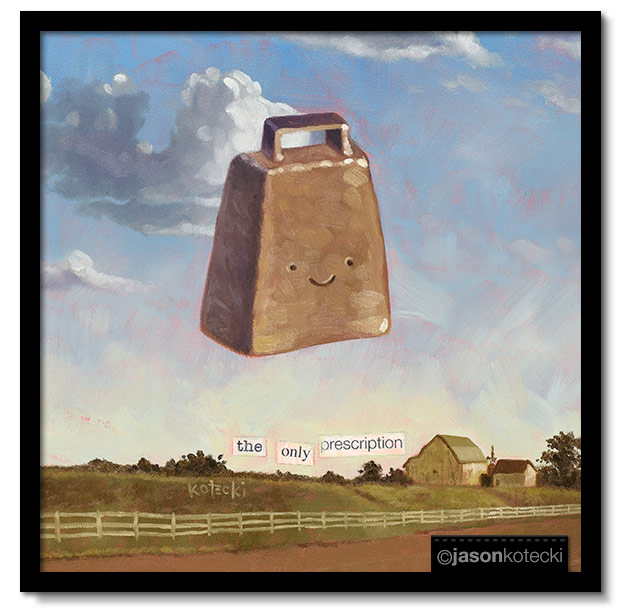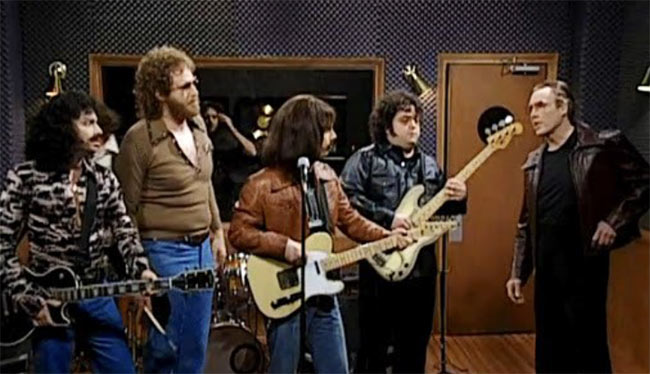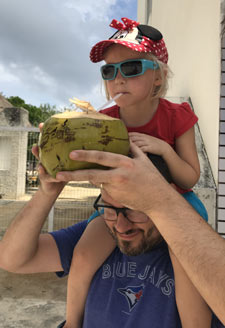
Prints available here.
Somehow, the television show Saturday Night Live took a lowly old cowbell and turned it into a pop culture phenomenon.
The famous skit imagines a studio session with the band Blue Oyster Cult recording their hit song “(Don’t Fear) The Reaper.” Christopher Walken, as “rock legend” Bruce Dickinson (“the cock of the walk, baby!”), singles out the little-used percussion instrument, played by Will Ferrell. Hilarity ensues as Dickinson urges the band to highlight the cowbell in the song.

Now the script was funny, and Walken and the other actors nailed their performances. But what is most interesting to me is that Ferrell and playwright Donnell Campbell, who co-wrote the sketch, first had to notice the cowbell in the original song by Blue Oyster Cult.
They noticed something most people didn’t and saw an opportunity.

During a family vacation in Mexico, we bought a coconut drink from a roadside vendor for about $2. We enjoyed the drink and threw out the shell. (What else would we do with it?) Then I recalled some of the restaurants we visited where frozen drinks were served in coconut shells with tiny umbrellas. Undoubtedly, those drinks sold for a higher price than the same one served in a boring old glass.
A “useless” coconut shell was transformed into something of value. Enterprising business owners had literally turned garbage into money.
Of course, flea markets and thrift stores do the exact same thing. And people who buy and flip fixer-uppers? Where most people see a dilapidated lost cause, they see a tidy profit and a future feature in a glossy magazine.
The most successful people see opportunities that others miss.
I’d argue that it’s not a talent; it’s a habit. In the middle of the Panic of 1873, a six-year recession, Thomas Edison invented the incandescent light bulb. In 1876, he established GE (General Electric Co.), which is now the third-largest company in the world.
In the late 1970s, the United States experienced an energy crisis, and inflation ballooned out of control, causing a major recession which lasted for thirty months.
In the midst of this economic storm, Applebee’s, Ben & Jerry’s, Olive Garden, and Fuddruckers were founded. In fact, all of the following entities were formed during a recession: Burger King, The Jim Henson Company, FedEx, CNN, Hewlett-Packard, MTV, Hyatt Hotels, Trader Joe’s, Sports Illustrated, and Wikipedia.
The first Apple Store opened in the recession of 2001 and was declared dead on arrival. Which, of course, it wasn’t; it was so successful that in the recession of 2008, many people considered Apple Stores to be recession-proof.
And according to Forbes, the COVID crisis was a catapult for launching over 4 million new small business ventures, the largest eruption in the history of our country.
I remember talking to an elderly real estate tycoon during that economic nosedive of 2008. He grumbled about how all everyone seemed to do was complain about the bad economy. All he could see was an abundance of opportunities, and he lamented that he didn’t have enough years left to take advantage of them all.
Most of the time, the difference between success and failure is determined by what we decide to see.
Indeed, the best time to buy stock is when the market is down.
The best time to start a business is when the economy is bad.
The best business ideas solve real problems.
We need you to look at the world as a child would, with big dreams, boundless optimism, and a vision of what’s possible.
We need you to see through new eyes and find the opportunity that is right under your nose.
We need more cowbell.